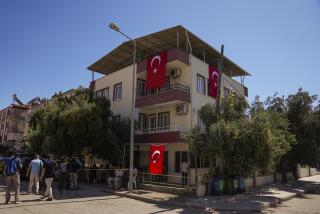Striking a Balance in Secular Turkey
- Share via
ISTANBUL, Turkey — When Greece’s prime minister kissed his Turkish counterpart’s wife, Emine Erdogan, during the couple’s recent visit to Athens, many here hailed the move as proof the two countries had buried their historical enmity. But for some pious Turks, the peck on the cheek was an outrage.
Television footage of the scene was instantly censored, and Erdogan was forced to assure her husband’s conservative constituents that nothing untoward had taken place.
The incident is emblematic of the conflicting pressures she has faced since her husband, Recep Tayyip Erdogan, a former Islamist, became prime minister in March 2003. Even as she reaches out to observant Muslims, Emine Erdogan has sought to overcome the distrust of Turkey’s fiercely pro-secular elite, who see her head scarf as an unmistakable symbol of Islamic militancy.
In a country struggling to calibrate the influence of religion in public life while seeking to become the European Union’s first predominantly Muslim member, she is uniquely positioned to prove that piety and modernity can coexist, analysts say.
Turkey’s laws forbid Islamic-style headwear in government offices and public and private schools. Spurred on by Turkey’s fiercely pro-secular military leaders, President Ahmet Necdet Sezer has kept Emine Erdogan off his guest list when entertaining foreign dignitaries.
“It’s a fine line to tread, and despite the humiliation she has to endure, Emine is performing brilliantly,” a European ambassador in Ankara, the Turkish capital, said, speaking on condition of anonymity.
Erdogan’s exclusion has won praise from Westernized Turks, who dislike being represented by a woman who they say projects a backward image of their country. A defiant Erdogan continues to maintain a high public profile nonetheless, accompanying her husband on most of his foreign trips, including one to Washington this year.
“What the secularists forget is that over half of all Turkish women cover their heads,” said Hidayet Sefkatli Tuksal, a feminist who leads a head-scarf advocacy group. “Erdogan is the true face of Turkey.”
Erdogan, 49, has retained her popular touch, joining devout Muslims in Ankara slums to break her Ramadan fast. She and her husband have rejected the luxury of the prime minister’s residence for a modest apartment in Ankara’s middle-class Kecioren neighborhood.
“In her own subtle way, she remains an excellent politician,” said newspaper editor Nazli Ilicak, a former member of parliament who has known the couple for many years.
Emine Erdogan is said to have helped draw up candidate lists for nationwide municipal elections that were held in March. “The prime minister has tremendous respect for his wife,” said Sema Ramazanoglu, an influential member of the women’s branch of the ruling Justice and Development Party.
Born into a modest ethnic Arab family from the southeastern province of Siirt, Erdogan was drawn to Islamist politics in her mid-teens. She met her husband, then a popular youth leader, at a rally in Istanbul. Struck by her beauty, Recep Tayyip Erdogan argued with his mother for months before she would agree to their union, writer Sule Yuksel Senler told the daily newspaper Tercuman. Senler, a female friend who introduced the couple, said his mother wanted him to marry a girl who wore the head-to-toe chador and not just a head scarf.
An active member of the women’s arm of a now defunct Islamist group, Emine helped her husband become mayor of Istanbul in 1994. He was forced to step down after being convicted in 1998 on charges of seeking to incite a religious uprising through a poem he had recited at a rally. He was jailed for four months on the charges.
The ordeal proved a watershed in the couple’s ideological evolution.
Recep Tayyip Erdogan broke away from the Islamists to form his own party, shedding his militant slogans in favor of calls for greater democracy, free-market economic policies and joining Europe. His wife, friends say, switched from the Shafi sect -- which follows an orthodox version of Sunni Islam -- to the more liberal Hanafi sect followed by most Turks.
Fiercely private Erdogan has not granted a single interview since her husband became prime minister. “You can shake her hand but ask no questions,” her personal assistant, Ela Cakici, warned at a recent fund-raising event in Istanbul.
Although she is a devout Muslim, Erdogan did not readily embrace her head scarf. In an interview with Turkish writer Gulay Atasoy for her 1995 book, “How They Covered Themselves,” Erdogan reportedly said she briefly contemplated suicide when one of her elder brothers insisted that it was time for her to dress in keeping with the Islamic faith.
“I was 15 at the time. It was natural I resisted,” Erdogan said. “Today I am happy with the way I am.”
More to Read
Sign up for Essential California
The most important California stories and recommendations in your inbox every morning.
You may occasionally receive promotional content from the Los Angeles Times.










